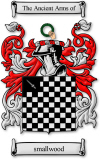A Little Family History
The present generation of the Smallwood family is only the most recent to bear a name that dates back to the ancient Anglo-Saxon culture of Britain. Their name comes from having lived in the township of Smallwood in the parish of Astbury in the county of Chesire. Habitation names form a broad category of surnames that were derived from pre-existing names for towns, villages, parishes or farmsteads.
Smallwood is an Anglo-Saxon surname that has survived the rigorous course of history to the present day. Emerging from the shadows of time, the records reveal the earliest origins of this distinguished family.
Historians have researched such ancient manuscripts as the Domesday Book compiled in 1086 A.D., by Duke William of Normandy, the Ragman Rolls(1291 - 1296) collected by King Edward 1st of England, the Curia Regis Rolls, the Pipe Rolls, the Hearth Rolls, parish registers, baptismals, tax records and other ancient documents. Researchers found the first record of the name Smallwood in Cheshire where they were anciently seated, at Smallwood in the parish of Astbury, some say before the Norman Conquest in 1066.
The name Smallwood, occurred in many manuscripts and from time to time the surname was spelt Smallwood, Smalwood, Smalewood, with these changes in spelling occurring, even between father and son. In the sixteenth century even literate people such as William Shakespeare varied the spelling of their own names. There are many reasons for these spelling variations, for instance official court languages such as Latin and French had their influence on how a name was recorded. In general, church officials and scribes recorded a name as it was told to them, rather than follow any spelling rules or conventions.
The Anglo-Saxon tribes produced many surnames such as Smallwood. These founding cultures settled in England in about the 5th century A.D., displacing the ancient Britons who populated the area in Roman times. The Angles and the Saxons established several independent kingdoms, Northumbria, Mercia, Wessex, Kent, Essex, Sussex and East Anglia, collectively known as the Heptarchy. All of these rival kingdoms were unified in the 9th century by Egbert, King of Wessex.
In 1066, the relative peace which the country has been existing under was shattered. The Norman invasion from France and their victory at the Battle of Hastings meant that many Anglo-Saxon landholders lost their property to Duke William and his invading nobles. Under oppressive Norman rule many families decided to move north to Yorkshire and beyond the border to Scotland.
The Smallwood family emerged as notable Englishmen in the county of Cheshire. In the 14th century they branched into Queyslade in Leicestershire, and also moved north and acquired the lands known as Belton Land in Renfrewshire Scotland, which was eventually sold to the Monks of Paisley for three pounds. Dorothea Smallwood of Queyslade married John Geste of Hansworth in Warwikshire in 1601. Henry Smallwood married Elizabeth Long of Hampton Lodge of Surrey. Distinguished members of the family at this time include Smallwood of Chesire.
Throughout the Middle Ages the Smallwood family flourished and contributed to English society. Later during the 16th, 17th and 18th centuries England was devastated by religious and political conflict. Conflicts between religious sects and between parliamentary and royalist forces created an unstable society. Many families were banished by the prevailing powers for dissention, other families chose to leave the turmoil behind.
In Ireland, Protestant settlers and soldiers in Cromwell's army were granted lands which had been confiscated from the native Catholic owners. The name Smallwood may well have arrived in Ireland with the "Cromwellian Adventures for Land." in the 17th century. At that time, 1,000 acres of land was available to settlers in Ulster for two hundred pounds, in Connaught for three hundred pounds, and in Leinster for six hundred pounds.
Upheaval at home forced some families to risk the perilous journey to the New World in order that they might build a better future for themselves. Members of the Smallwood family were amongst the settlers who boarded ships bound for Canada, the United States, Australia and the other colonies held by the British Crown.
Settlers bearing the surname Smallwood, or a variable spelling of the family name include Randall Smallwood settled in Virginia in 1623, Samwell and Martha Smallwood settled in Maryland in 1699; Randolf Smallwood settled at the Delaware River in 1685; Mathew Smallwood settled in Virginia in 1652; Joseph Smallwood, ancestor of Joey Smallwood settled at Prince Edward Island in 1783; David Smallwood was a trader at Ship Island, BonnaVista Bay, Newfoundland in 1871.
